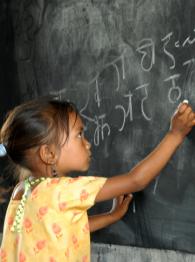
About the Project
This project is one of the 2011 WISE Awards finalists.
Move 4 New Horizons is an educational program for vulnerable, disadvantaged children who are deprived of education. It is implemented by the Swiss Academy for Development (SAD) and the Nepalese grassroots non-profit Dalit Welfare Organization (DWO). Over a period of three years, an innovative approach to education was piloted in non-formal education classes. Out-of-school children were taught basic reading, writing and mathematical skills in a playful way by systematically incorporating well-guided sporting and play activities into daily teaching. The program thus represents a holistic approach to education, supporting the psychosocial development of children who have experienced discrimination and improving their future prospects by preparing them to enter the formal education system. Since the playful approach has proved to be particularly well-adapted to the needs of educationally deprived children, the project’s outreach was expanded to early childhood development (ECD) and vocational training (VT) to ensure an educational continuum for disadvantaged children and youths. At the moment, 15 ECD centers, 10 NFE classes and 10 VT courses are located in different rural villages, targeting low-caste children and young people between the ages of 3 and 22 with the aim of integrating them into the formal education system or enabling them to compete in the job market.
Context and Issue
The Nepalese constitution guarantees equality for all Nepalese citizens, regardless of social status or gender. Nevertheless, it remains difficult for families of the lowest caste (Dalits), indigenous peoples (Janajatis) and girls to access educational services – even more so in the project area, as statistics show. Youth unemployment is a serious issue in the target communities, especially for members of lower castes, for whom certain professions are still considered inaccessible, and for girls. For many, the most attractive way out of this situation appears to be searching for work abroad as unskilled labor.
The early years being the most important developmental phase, interventions at pre-school age are particularly effective and set a critical foundation for the course of a child’s life. Non- is a powerful tool to (re-)integrate children into public schools and encourage parental involvement in education. Both early childhood development and non formal education help break the intergenerational transmission of disadvantage and have been shown to benefit marginalized children in particular. M4NH’s vocational training program aims to provide Nepalese youth with career prospects in their own communities to discourage them from leaving the country, thereby preventing the negative impact of migration (exploitation, abuse and the break-up of communities).
The Solution and Impact
The playful teaching approach of non formal education addresses child development in a holistic way. The strength of the project lies in the fact that it develops emotional, social, cognitive and motor skills by teaching basic school knowledge in an interactive setting. In early childhood, a varied daily program stimulates preschoolers’ language abilities, pre-math skills and curiosity. The vocational training program follows a dual approach: young people qualify for the job market by completing lessons on business knowledge alongside practical skill training. To develop their social competencies such as decision-making, negotiation and communication skills that are crucial in professional life, sports activities are systematically included in the curriculum.
External assessments and self-evaluation results have shown the effectiveness of this innovative, playful approach: during the pilot phase, 97 percent of the non formal education graduates (around 850 children) were enrolled and approximately 94 percent of them retained in the formal education system. Despite these children coming from a disadvantaged family background, their performance later at primary school has been on a par with – and in some cases much better than – that of their peers. In addition, a more relaxed atmosphere was created within the classes. Furthermore, children learned how to be part of a group, to trust their teacher and to trust their own competencies.
Future Developments
Since its inception in Nepal, SAD has replicated the project approach in different countries and contexts – adapting the playful teaching methodology to accommodate the specific needs of the communities, children and youth targeted. In doing so, disadvantaged pre-school children were prepared for entry into government schools in India and the Palestinian Territories. Learner-centred environments were promoted to benefit children and young people in primary and secondary education in Myanmar, Zimbabwe, Uganda and Colombia. Young people benefitted from interactive entrepreneurship training or vocational training in Colombia, Papua New Guinea, Myanmar, Zimbabwe and Bangladesh. SAD is very much interested to training teachers on the interactive, playful learning methodology also in the future.


